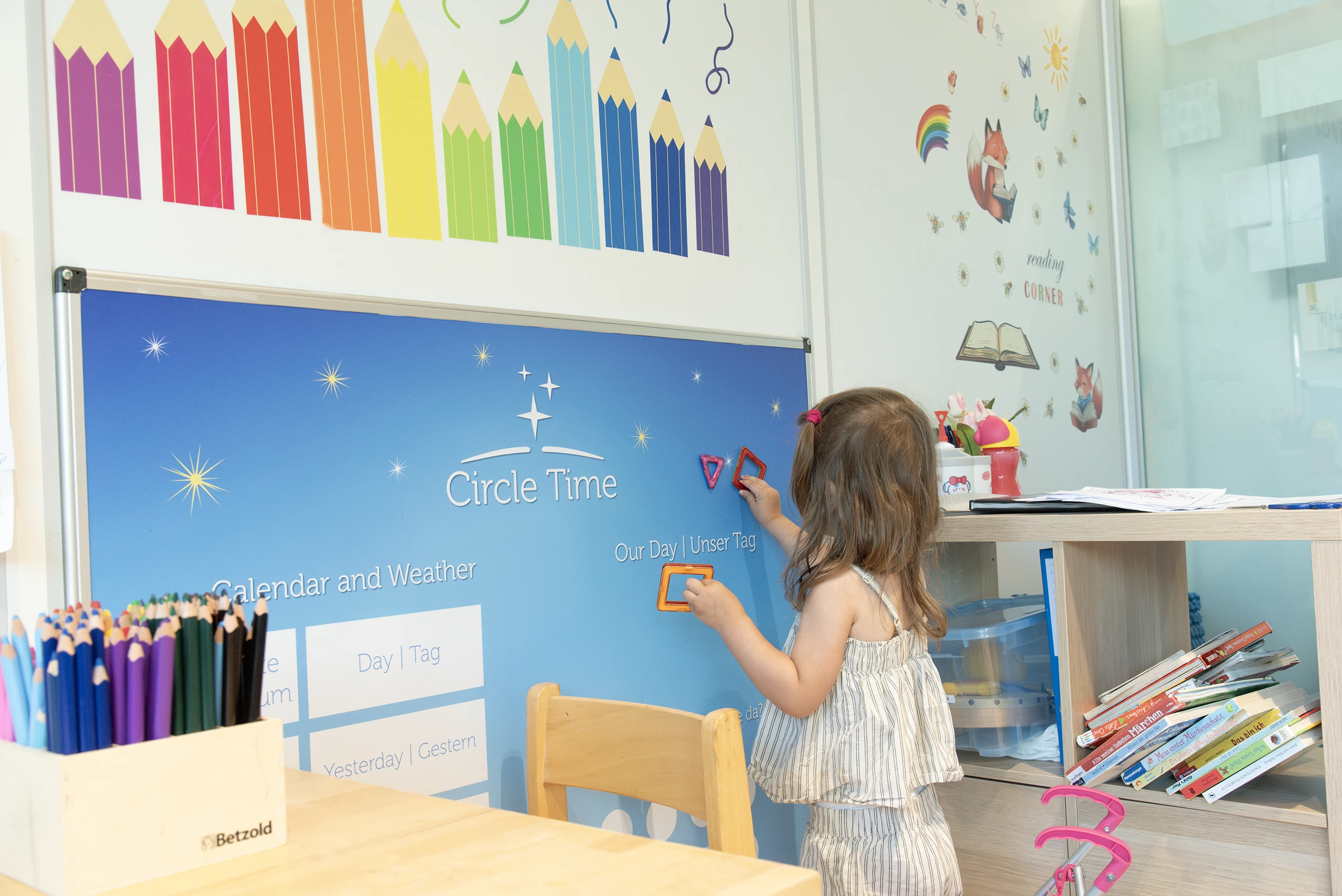25 Jahre Little Star — Jubiläumsangebot: 25% auf die ersten 5 Monate!
25 Jahre Little Star — Jubiläumsangebot: 25% auf die ersten 5 Monate!

Timing: 6:00am-2:00pm
.avif)

At Little Star Day School, each face is assigned a language. In science, this is called the immersion principle: one group of our carers speaks exclusively German, the other group exclusively English. This way, children encounter both languages naturally in daily care and immerse themselves in a genuine "language bath".
Children's brains are particularly receptive to languages in the first years of life. Through the consistent assignment "one face = one language", children don't learn both languages as foreign languages, but as natural means of communication. They develop an authentic feel for language and switch intuitively between languages depending on their conversation partner.
Children immerse themselves in a language bath and repeatedly encounter each respective language. In daily practice, this means that activities and learning centres are offered and conducted by both English and German-speaking carers. This way, not only is the content of a topic conveyed in both languages, but specialist terms are also learned in both languages.
For children with other mother tongues, our immersion principle is particularly valuable. We recommend that parents discuss nursery topics at home in the family language too. This way your child develops trilingual understanding and can express concepts in all languages.
An important part of our bilingual nursery is that children don't only learn languages from the carers, but also from other children. The Little Star family has a very international character. About half of the children have German or English as their mother tongue or family language. This way children learn from each other – whilst playing.
This peer-learning situation is invaluably valuable for language development. When a German-speaking child builds together with an English-speaking child, bilingual conversations arise quite automatically. "Kannst du mir den roten Block geben?" becomes "Can you give me the red block?" - and both children learn new expressions through play. These natural language situations are often more effective than any structured teaching.
Some parents ask our teachers: Why is bilingual early education an advantage? We believe, and research shows, that bilingualism is not just about switching between languages. Speaking two or more languages has an enormous impact on a child's brain.
Bilingual children show better problem-solving abilities and can focus more specifically on different tasks. The brain is trained like a muscle.
Children who can successfully switch between languages develop strong self-esteem and more courage to tackle new challenges.
Through contact with different languages and cultures, children develop tolerance, openness and understanding for diversity from an early age.
What is learned in the first years remains for a lifetime. Bilingual children later have clear advantages when learning additional languages.
The language concept of our bilingual nursery combines natural immersion with structured programmes. Alongside daily language immersion, we use scientifically-based methods that have been specially developed for respective age groups. This way we ensure that every child receives optimal support in both languages and gains a solid foundation for their further language development.
You're interested in our bilingual nursery and have questions about bilingual development? Here you'll find answers to the most common questions parents ask us. Should you have further questions, please feel free to contact our family advisers – we'll provide personal and non-binding consultation.
Children benefit from our bilingual concept from as early as 6 months. The first years are the critical phase for language acquisition – the brain is particularly receptive during this time and can effortlessly process multiple languages simultaneously. With baby sign language, even our youngest children begin to communicate, laying the neurological foundation for later bilingualism. The earlier children come into contact with both languages, the more naturally and accent-free their language competence develops.
No, quite the opposite is true. Research results clearly show that children can effortlessly learn multiple languages simultaneously without becoming confused. Our proven immersion principle "one face, one language" creates clear structures: children know exactly which language to speak with which person. This consistency prevents confusion and enables children to develop both languages as natural means of communication. Studies even demonstrate that bilingual children develop more flexible thinking structures and better problem-solving abilities.
Our children are optimally prepared for both Swiss schools and international schools. Our full-day kindergarten follows the Swiss Lehrplan 21 and the International Primary Curriculum (IPC), so all educational pathways remain open. Children develop reading and writing skills in both languages in parallel and master both everyday and academic language. At the end of their Little Star journey, you'll receive comprehensive documentation of your child's school readiness, which helps with school selection and gives the new school valuable insights into your child's strengths and language competencies.
Talk with your child about nursery experiences in your family language and encourage them to tell you about their bilingual experiences. Read books in both languages and watch age-appropriate films or videos together. For children with other mother tongues, we recommend discussing nursery topics in the family language too, so your child understands concepts in three languages. It's important that you stay relaxed - your child will automatically correct you if you use an English word, showing how naturally they switch between languages.
The costs for our bilingual nursery depend on the chosen scope of care and cantonal tariffs. Our all-inclusive concept includes meals, nappies, outings and all educational programmes without hidden additional costs. This way you can focus fully on your child without worrying about additional expenses. Our family advisers are happy to provide personal consultation about the various care models and create an individual quote for you.
.avif)